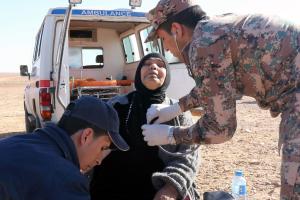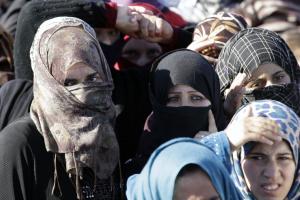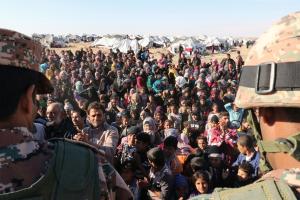Hadalat (Jordanie) (AFP) - Abdelhadi Zarara, six children in tow, juggles with his emotions as he crosses into Jordan, as thousands of other Syrian refugees wait in no-man's land hoping their turn will come.
Zarara, 39, says "there was nothing left for me in Syria," where his wife was killed a few months ago in a regime bombardment that also destroyed the family home in southern Daraa province.
According to Jordanian authorities the number of Syrians stuck along its desert border with Syria jumped from a few hundred three months ago to 16,000 by the start of January.
They are fleeing the nearly five-year war, leaving behind death and devastation in the hope of making a new life in Jordan or beyond, with many eying Europe as their final destination.
But only 50 to 100 will be lucky enough to cross into Jordan each day, according to the army and aid agencies.
The kingdom says it is hosting 1.4 million Syrian refugees -- equal to 20 percent of Jordan's population and more than twice as many as the 600,000 figure given by the UN refugee agency UNHCR.
View gallery

A Syrian woman receives medical attention after crossing into Jordan, at the Hadalat border crossing …
During the first two years of the Syrian conflict, there were 45 crossing points along the 378-kilometre (235-mile) frontier.
Now just two remain open, in rocky, hard to access areas devoid of water, shade or vegetation, according to UNHCR.
One of them is at Hadalat, 500 kilometres northeast of the capital Amman, while the other is at Rokbane, 70 kilometres further east.
Around 1,300 Syrians are stuck in Hadalat, while in Rokbane 15,000 are trapped in dire conditions, said General Saber Al-Mahayra, the head of Jordan's border guards unit.
- 'Weeding' out jihadists -
View gallery

Jordan says it is hosting 1.4 million Syrian refugees -- equal to 20 percent of its population and m …
Intensified fighting in Syria, including the launch of Russian air raids in September in support of Damascus, has sparked a fresh wave of refugees seeking safety in Jordan, Mahayra said.
Zarara and his children arrived in Hadalat in October.
"There weren't many people around and we had nothing to protect us from the cold and the rain," he said.
The Jordanian army gave them food and blankets but it was only several weeks later that UNHCR provided shelter in the form of tents, he said.
In early December, UNHCR and New York-based Human Rights Watch issued separate pleas urging Jordanian authorities to allow all the refugees to enter the desert kingdom, warning of deteriorating conditions.
View gallery

Intensified fighting in Syria, including the launch of Russian air raids in September in support of …
But Jordan has stood its ground, allowing only a trickle at a time in and insisting that it must screen newcomers to ensure they are genuine refugees and not armed jihadists seeking to infiltrate the country.
"Our security is above everything else," said Mahayra.
After the conflict erupted in March 2011, Syrians who sought refugee in Jordan were mostly from the southern Daraa province across the border, he said.
But recent newcomers have travelled from as far as Raqa, the self-declared capital of the Islamic State group in northern Syria.
"In a bid to weed out jihadist infiltrators, the army is carrying out meticulous controls at the border," Mahayra said, adding that two suspected jihadists who tried to pass for refugees were recently arrested.
View gallery

Jordan is allowing in only a trickle at a time and insisting it must screen newcomers to ensure they …
- Eyeing Europe -
Riyadh, 23, was one of the lucky few who entered Jordan on Thursday after "83 painful days" trapped in no-man's land, he said as he dusted off his clothes caked in sand.
He too came from Daraa, after losing hope that he would be able to finish his last year at university there.
"Security conditions won't allow it," he said.
Hassad, who crossed into Jordan with his wife and five children, said he had to pay people smugglers 100,000 Syrian pounds ($440, 400 euros) for each member of his family.
"I am hoping for a better future for my children," he said, adding that Jordan would only be a stepping stone towards their new life.
"Our goal is to travel to Europe, soon I hope," he said.
Army trucks lined up on the Jordanian side of the Hadalat crossing to transport the newcomers to a reception centre where refugees would undergo medical checks and further security controls.
After that they will be taken to one of two refugee camps in northern Jordan -- Zaatari or Azraq -- which are run jointly by the Jordanian authorities and the UN.
The camps are home to about 20 percent of all Syrian refugees in the kingdom.